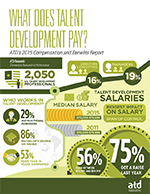ATD Blog
What Does Talent Development Pay in 2015?
Tue Oct 20 2015

In summer 2011, the Association for Talent Development (ATD) and the Institute for Corporate Productivity (i4cp) found that the typical learning and development professional in the United States earned between $70,000 and $79,999 a year.
Four years later, What Does Talent Development Pay? ATD’s 2015 Compensation and Benefits Report finds that the median salary has remained the same, despite the fact that the unemployment rate has dropped considerably since 2011 as the country has emerged from a recession. In both 2011 and 2015, 56 percent of talent development professionals earned between $50,000 and $89,999.
TD Salaries Stagnate
That the median salary has remained in the $70,000s is cause for concern—given that the 2015 figures are not adjusted for inflation. With inflation adjustments, a salary of $75,000 in 2015 is equivalent to $70,000 to 71,000 in 2011 dollars, meaning a decline in purchasing power. A $70,000 salary today is equivalent to $66,000 in 2011 dollars. Sluggish growth in real (or inflation-adjusted) wages during that time period is not unique to talent development professionals.
On a positive note, the percentage of learning professionals making less than $50,000 today is significantly lower today than in 2011, and the percentage reporting salaries above $120,000 is higher than it was in 2011. This suggests improvements in entry-level pay and pay for upper management.
About TD Professionals
The typical survey participants in 2015 had similar formal education, experience, span of control, and specialties as their 2011 counterparts. Over 80 percent had a Bachelor’s degree or higher, and slightly over half had at least ten years of experience in the profession. Not surprising, the factor associated with the greatest increase in salary was span of control, with managers, directors, and executives earning more than individual contributors.
Also, living in the Northeast or West (where cost of living is higher) and having more experience were also among the factors associated with a larger paycheck. Those who named delivering training as their primary area of job responsibility earned less than those who selected other specialties, including instructional design and leadership development.
Non-Salary Compensation
What Does Talent Development Pay? also takes a close look at the non-salary compensation and benefits that talent development professionals receive. Among survey participants, 88 percent reported that their employer offered group medical coverage. Further, nine out of 10 have access to a workplace savings plan, such as a 401(k) or 403(b).

The report draws on survey responses from 2,050 talent development professionals at all corporate levels working in the United States. The full report is available online at www.td.org/salaryreport.
You've Reached ATD Member-only Content
Become an ATD member to continue
Already a member?Sign In
